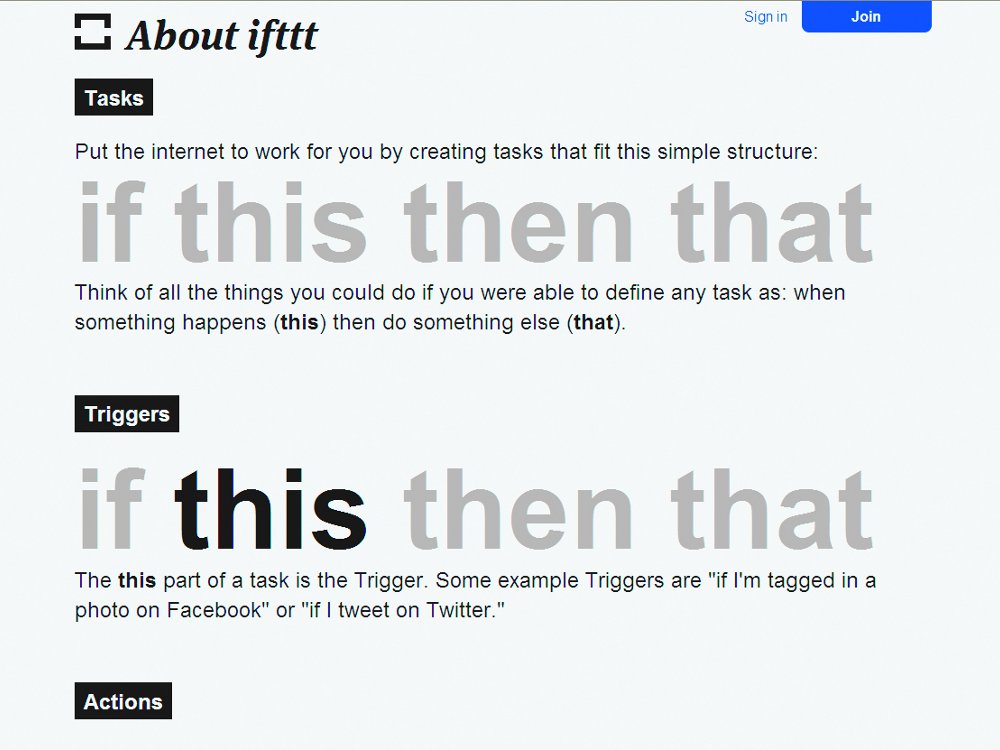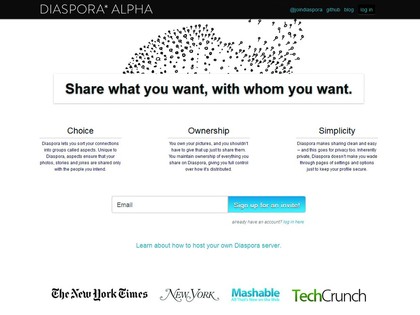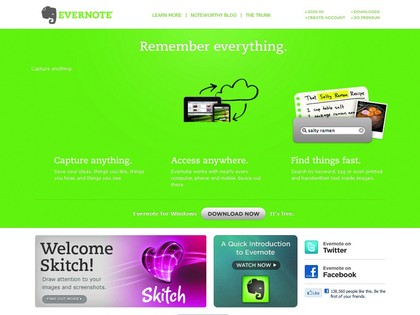
Sign up for breaking news, reviews, opinion, top tech deals, and more.
You are now subscribed
Your newsletter sign-up was successful
Groundbreaking websites are all around us, and if you believed every company that positioned itself as the latest, greatest thing, you'd have an awful lot of bookmarks in your browser.
Sites come and sites go, but it's rare that one makes enough of an impact on your life to revolutionise how you use the internet.
But occasionally sites come along that offer a genuinely new way of finding, storing or curating stuff on the web. We've put together a list of 20 websites we think could let you use the internet in a way you haven't done before, save you time, make you money and let you enjoy yourself in the process.
We've found new sites that offer functionalities not found elsewhere, but we've also included a few that have been around for a while, but have really come into their own in recent years. We may have highlighted them because they are about to come out of beta, or because they have just matured into popular and interesting tools worthy of an introduction if you missed them the first time around, or a re-evaluation if you didn't.
What we do on our PCs is moving increasingly to the cloud, with free storage and utilities becoming the norm. We like to think we've found the sites that can help you get the best web services available to make your online life as pleasurable as possible.
The breadth of services online means you really can change your life using the internet. With the websites we've covered you can discover new music, set up your own radio station, play the latest high-end games, book holidays or bring down a corrupt corporation, all from your web browser.
Then there's the social side, where we've discovered sites that enable you to use online pinboards, create compelling stories from social media, share free music and even write your autobiography, all of which can help you find a new way of expressing yourself, or find others who are interested in the same thing as you.
Sign up for breaking news, reviews, opinion, top tech deals, and more.
Whether it's keeping aide-mémoires, finding images and notes, solving problems using crowd sourcing or automating admin tasks, we reckon we've got a site that will change your web browsing habits forever.
1. Ifttt

The whole point of computers when they were first introduced to the workplace was to automate tasks to make humans' lives easier. Complex calculations could be done in seconds, freeing up the human operators to concentrate on more cerebral matters. Nowadays, it's the computers themselves that are creating more and more menial and repetitive tasks that keep us away from the important things in life.
These range from keeping up with social networks and backing up photos and documents to weeding out the important emails from the morass of special deals from shops and reminders about internet services you signed up to five years ago.
Wouldn't it be nice to cut through all that and make the internet work for you? For it to do these tasks automatically, or tell you when something happens that you are genuinely interested in?
What if every time you uploaded a picture to Instagram it was automatically backed up to your Dropbox account? Or if the release dates for new films magically appeared in your Google calendar? Wouldn't it be good if, when you were 'working from home', you got a text message letting you know when your boss had emailed you? Yes? Then Ifttt is for you.
'Ifttt' stands for 'if this, then that'. This type of command is the basic premise behind most programming languages. The Ifttt website enables you to link commonly used services and devices (or 'channels', as it refers to them) and arrange for an action to occur on one service when certain conditions have been fulfilled on another.
These channels include a great variety of common tools - social media sites such as Twitter and Facebook, photo services including Instagram and Flickr, note-making apps such as Evernote and Instapaper, and even phone-based services such as generating text messages and making calls.
Each of these channels can be connected to another, and when triggers are applied to them - say 'every time one of my tweets contains a certain hashtag, back it up to Evernote, the note-making tool' - it will carry them out automatically, saving you time and helping you stay organised.
If you feel your programming skills may not be up to the task, there are 'recipes' so you can get commonly used linkups and apply them to your own services. It's deceptively simple and powerful, and as more services are added it could revolutionise the way you use the web.
2. Diaspora

Back in April 2010, four computer science students from New York University were so unimpressed by Facebook's lack of privacy controls that they decided to create their own decentralised open source social network.
To do this they tried to raise $10,000 on kickstarter.com, but the idea of a more controllable network was so popular that by June they had raised over $200,000. This caused a flurry of media interest that talked it up as the next big thing and then, as so often happens, it was quietly forgotten. Since then it has gone through a buggy alpha developer build and is just about to appear in beta form. So why are we championing it as a new way to use the internet?
Diaspora was built as a reaction to the privacy issues of Facebook, and these issues are still a worry today. What's more, with the latest changes to Facebook (such as the forced implementation of the Timeline) taking even more control away from the user, maybe it's time for a site that's described as "the privacy aware, personally controlled, do-it-all distributed open source social network".
Diaspora wants to make privacy key to social networking - it doesn't plan to share any of your information. You control every aspect of your Diaspora experience, without having to wade through pages of settings to keep your profile secure.
You can also control what you see and how you see it. Diaspora came up with Google+'s Circles before Google did - except it calls them Aspects - so you can choose to share your posts and photos with only those groups of friends you choose. It also enables you to integrate other social networking services, including Twitter and Facebook. It's a truly open social experience that puts you back in the driving seat.
Some people are saying Diaspora is too late to the party, and it's certainly true that it's been teasing us with the beta version for a while. But if you value your privacy and want to control how your data is seen by others, it's likely that you'll end up on Diaspora in 2012, even just to give it a try - if its developers can manage to get it out of beta in time.
3. Evernote

Although it calls itself a note-making site, Evernote can be used for much more than that. In short, Evernote lets you quickly create a searchable database of all your interests and aide-mémoires, whatever form they take - from photographs and audio clips to screenshots and webpages, Evernote will keep it all for you, and has some clever little tools to let you find them again.
For example, if you want to upload a picture with some text on it, Evernote has OCR (optical character recognition) technologies built into it, so those words are automatically analysed and added to its database. This means that any archived pictures of people with name tags, slides from important presentations or screenshots of useful websites are only a text search away.
You can also search Evernote's database by the date on which the note was created, or by the tags you use to label your data. You can organise your notes and photos into Notebooks, keeping similarly themed information together in the same place. If you're worried about the sensitivity of information you are placing on Evernote, you can encrypt notes to make them as secure as possible. You can also share notes or notebooks with others so you can collaborate on projects together, making it a handy business tool too.
Another handy feature of Evernote is the web clipper. This website extension lets you save the HTML of a webpage as a note. Instead of bookmarking a site, you save the info on that page, future-proofing yourself against the web page disappearing from that site.
Much like services such as Dropbox, Evernote will also sync all your information between any of your web-enabled devices, so the same notes and information are accessible whether you're on your work PC, on your phone or using a laptop on the train.
Evernote syncs automatically each time you turn your device on, so it all happens in the background without you having to think about it. It also changes the way it works slightly according to whether you're using it on a desktop PC, phone or tablet so that its functionality suits the platform. For note-taking on the go, Evernote may mean you never forget or lose anything again.
Read our full Evernote review
4. ChallengePost

What's the best way to find the answer to a problem? Ask as many people as possible until you find the perfect solution, of course. How do you get people to take the time to solve your problems? Simple, offer a reward for the best solution.
This is what ChallengePost does. It offers challenges from companies, charities and even governments to see if the public can help solve them, usually for a cash reward. It's a clever idea: crowd sourcing offers the best way to get as many perspectives as possible.
Creator Brandon Kessler came up with the idea after seeing a blog post that offered $100 to anyone who made a program that would run Windows on a Mac. Other people also had the same problem, and added to the prize fund to the tune of a staggering $14,000. A programmer soon came up with a solution to the challenge, which he wrote in three days. Kessler was so impressed with the idea that he decided to create an eBay of challenge-based problem solving and hired the blog post writer as his chief of product.
Once created, ChallengePost soon picked up high-profile clients, including an app developer contest for the City of New York and a healthy eating campaign headed up by Michelle Obama. ChallengePost has also been named the official online 'challenge platform' of the US Federal Government.
The site clearly works; setting something as a public challenge can lead to a lot more people getting involved, creates more awareness of the problem, and often generates innovation in a way that isn't usually possible using more conventional methods.
It isn't just the financial reward that motivates people either - acclaim or just a recognised need to solve a problem seem to be just as powerful, often leading to solutions involving a lot more work than the reward would normally warrant. It seems ChallengePost is encouraging altruism simply by making people aware that the problem is there.
So, a website that challenges you to make the world a better place and rewards you for sharing your ideas or fully-fledged concepts? If this isn't the future we'd like to be part of, we don't know what is.